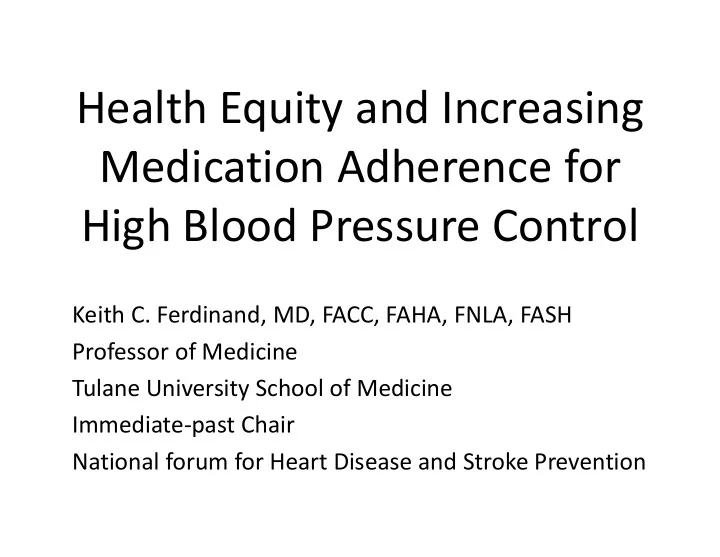

Health Equity and Increasing Medication Adherence for High Blood Pressure Control Keith C. Ferdinand, MD, FACC, FAHA, FNLA, FASH Professor of Medicine Tulane University School of Medicine Immediate-past Chair National forum for Heart Disease and Stroke Prevention
Keith C. Ferdinand, MD Has disclosed the following affiliations. Any real or apparent COIs related to the presentation have been resolved. Speaker’s Bureau -None Grant/Research Support -Boehringer Ingleheim Consultant -Amgen,Sanofi,Boehringer Ingleheim, Eli Lilly Stocks-None Patents-None
Webinar goals • At the end of the session, listeners will learn how health equity impacts high blood pressure(HBP) control and the ability of healthcare providers and patients to maintain medication adherence including:
Webinar goals • Review the impact of health disparities and working towards health equity on HBP control. • Note challenges that both the healthcare provider and patient face in controlling HBP through medication adherence, especially in minority populations.
Webinar goals • Identify strategies for the healthcare provider and the patient to reduce disparities in achieving BP control through medication adherence.
Health Equity • Absence of avoidable or remediable differences among groups of people (defined socially, economically, demographically, or geographically). • Health inequities therefore involve more than inequality with respect to health determinants, access to the resources needed to improve and maintain health or health outcomes. • Also entail a failure to avoid or overcome inequalities that infringe on fairness and human rights norms http://www.who.int/healthsystems/topics/equity/en/
Prevalence of HTN in adults aged≥18, sex,race and Hispanic origin: US, 2011–2014 NCHS Data Brief; No. 220 ;CDC/NCHS, NHANES, 2011–2014 NCHS Data Brief; No. 220 ;CDC/NCHS, NHANES, 2011–2014
Prevalence of controlled HTN in adults with HTN aged≥18, by sex and race and Hispanic origin: US, 2011–2014 Million Hearts Goal 65% NCHS Data Brief; No. 220 ;CDC/NCHS, NHANES, 2011–2014
U.S. HTN-related Death Rates: Race and Hispanic Origin NCHS Data Brief, no 193. March 2015. http://www.cdc.gov/nchs/data/databriefs/db193_table.pdf#3. CDC/NCHS, National Vital Statistics System, Mortality.
http://millionhearts.hhs.gov/Docs/BP_Toolkit/TipSheet_HCP_MedAdherence
Antihypertensive Medication Adherence Matters • Critical to successful HTN control for many patients. • However, only 51% treated for HTN follow health care professional’s advice for long-term medication therapy. • High adherence associated with higher odds of BP control, • But non-adherence to cardio-protective meds increases risk of death from 50% to 80%. http://millionhearts.hhs.gov/Docs/BP_Toolkit/TipSheet_HCP_MedAdherence
Initial Medications For The Management of Hypertension Lifestyle Modification—Especially Diet and Exercise b -blockers should be Diuretics included in the regimen if there is a compelling indication for a b - Black population blocker ACE inhibitors Calcium or antagonists ARBs JAMA 2014; 311(5): 507-520. Feb 5, 2014
Algorithm AHA,ACC, and CDC Go,AS et al J Am Coll Cardiol . 2013;
Systolic Blood Pressure Intervention Trial (SPRINT) SPRINT Research Group, et al. N Engl J Med. 2015;373(22):2103-16
BP in SPRINT
SPRINT Major Inclusion Criteria • ≥50 years old • SBP : 130 – 180 mm Hg (treated or untreated) • Additional CVD risk: – Clinical or subclinical CVD (excluding stroke) • (CKD), defined as eGFR 20 – <60 ml/min/1.73m 2 – Framingham Risk Score for 10-year CVD risk ≥ 15% – Age ≥ 75 years
SPRINT Major Exclusion Criteria • Stroke • DM • Polycystic kidney disease • Congestive heart failure (symptoms or EF <35%) • Proteinuria >1g/d • CKD with eGFR < 20 mL/min/1.73m2 • Adherence concerns
SYSTOLIC BP INTERVENTION TRIAL (SPRINT) SBP 120 vs 140 mmHg • Recruited 9,361 pts, 38% Blacks and minorities • ~30% > age 75, Mean age is 68 • 20% with CVD • Scheduled to end patient follow-up in 2016 • Stopped 9/11/15 due to total mortality/CV benefitS • www.sprinttrial.org
What Is Being Done: Health Literacy • Particularly challenging in racial-ethnic healthcare disparity • Almost half (48%) of patients with hypertension or diabetes had inadequate health literacy – Less knowledge of their disease, important lifestyle modifications, and essential self-management skills • Multicultural & multilingual patients tools can be valuable in this area US Dept of HHS Office of Minority Health http://www.omhrc.gov/
Self-Measured BP Monitoring (SMBP) SMBP: the regular measurement of a patient’s own BP with a personal monitor outside a clinical setting, usually at home. One strategy to improve BP control- when supported by clinical staff Also known as home monitoring Call to Action issued by AHA, ASH, and PCNA in 2008 and recent GLs millionhearts.hhs.gov
Team members: activities • Providing support and sharing responsibility for HTN care, such as: • Medication management Patient follow-up • Helping patients adhere to their BP control plan • Monitoring BP routinely • Taking medications as prescribed • Reducing sodium in the diet • Increasing physical activity millionhearts.hhs.gov
What You Can Do? • As a health care professional, you can empower patients to take their medications as prescribed. • Effective two-way communication is critical. • In fact, it doubles the odds of your patients taking their medications properly. http://millionhearts.hhs.gov/Docs/BP_Toolkit/TipSheet_HCP_MedAdherence
6 steps to improving patient understanding 1. Limit the amount of information provided at each visit 2. Slow down 3. Avoid medical jargon 4. Use pictures or models to explain important concepts 5. Assure understanding with the “show-me” technique 6. Encourage patients to ask questions Weiss BD. Health Literacy and Patient Safety: Help Patients Understand. Manual for Clinicians, 2nd edition. Chicago, IL: AMA Foundation, 2007
Use the SIMPLE method to help improve medication adherence among your patients • S implify the regimen • I mpart knowledge • M odify patients’ beliefs and behavior • P rovide communication and trust • L eave the bias • E valuate adherence http://millionhearts.hhs.gov/Docs/BP_Toolkit/TipSheet_HCP_MedAdherence
Take Home Messages
Take Home Messages • Disparities in HTN are significant, especially affecting African Americans • Current recommendation of <140/90 mmHg associated with dramatic reductions in HTN complications with BP ↓ often with combination therapy • Focus should be on patient adherence and team-based care
Recommend
More recommend